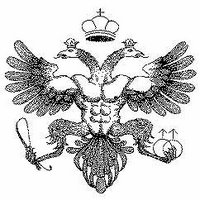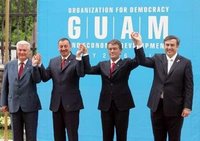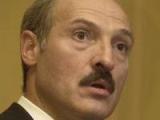 Yesterday, thirteen years had passed since the law prohibiting homosexuality was abolished in Russia. Yesterday, Russia's first pride parade was crushed by police. The event was carried through, despite an official ban on a LGBT-demonstration in the streets of Moscow. However, it seems that this opportunity to advance homosexual rights in Russia was lost by the Pride organisers.
Yesterday, thirteen years had passed since the law prohibiting homosexuality was abolished in Russia. Yesterday, Russia's first pride parade was crushed by police. The event was carried through, despite an official ban on a LGBT-demonstration in the streets of Moscow. However, it seems that this opportunity to advance homosexual rights in Russia was lost by the Pride organisers.
The Moscow Pride parade was preceded by a prolonged legal battle with authorities for the basic right of assembly and demonstration. Moscow mayor Yuri Luzhkov was among those that at an early stage
tried to prevent Moscow Pride. This comes as no surprise, as the LGBT-movement has all the more become a target of populist politicians. Less than a month ago, right-wing demonstrators
prevented a gay party in Moscow.
So, what happened in Moscow on Saturday? In short, organisers decided to carry through the Moscow Pride march, despite a Friday court decision to prohibit it. In view of the legal battle and anticipated violent right-wing protests, the turnout was small - 50-100 people at the most. As expected, they were confronted by a much larger right-wing anti-demonstration of
skinheads, Orthodox clergy, and general reactionaries. Also, more than 1,000 riot policemen oversaw the parade. Thus, it was the general setup for running the gauntlet for gay rights in Central and Eastern Europe, as witnessed over the last year with gay events in e.g. Warzaw and Kiev. The few brave LGBT-rights demonstrators started out facing the general bigot scorn and phsyical abuse expected in these parts of the world. All things alike, this is however where similarities ended.
Approaching the Red Square, Pride organisers decided to go along with plans of laying down flowers at the Tomb of the Unknown Soldier, thus equating the fight for gay rights with the victims of the fight against fascism in WWII - Russia's Great Patriotic War. This was a provocation that

Russian authorities could not accept, and the tumultuous reactions to this attempt led to the arrest of some 40 gay activists as well as 30 anti-demonstrators. Thus, the Moscow Pride parade was dispersed by riot police, under the close supervision of international media. Organisers must have been aware of the effect this was destined to provoke. Controversial actions at this national memorial next to always lead to stern police reaction.
Having stated the facts, there is reason to question whether the Pride manifestation at the Tomb was in the best interest of the Russian LGBT-movement. The Tomb of the Unknown Soldier is Russia's most revered national shrine to the approximately 20 million soviet citizens who perished in WWII. Its fundamental significance to the relatives of victims of fascist oppression is something that goes far beyond politics. Therefore, any attempts at exploiting the monument for purposes other than commemorating the victims are regarded a grave sacrilege by most Russians.
However, it is everyone's right to commerorate the victims of fascism at the Tomb of the Unknown Soldier. This right is even more important for homosexuals to be allowed exercising, not least while gay and lesbian rights are human rights. Fascist crimes against gay people during WWII were especially heinous, why LGBT-victims should be rightly revered. Commemorating gay victims of fascism deserves greater attention, and the issue has until recently largely been overlooked by historians and society alike.
So, what was the purpose of laying down flowers at the Tomb of the Unknown Soldier? Was it "a symbolic protest to equate the struggle for gay rights with the struggle against fascism in World War II," as
BBC reports, or was it to commemorate LGBT-victims of fascist aggression? Little evidence to support the latter is regrettably found. Being aware of walking a thin line concerning a discussion on the confines of exercising one's rigths, the question still deserves to be put, what the motive for this action was.
Whereas there is no doubt whatsoever of the right of access for all to a national monument like the Tomb of the Unknown Soldier, exercising this right may prove disastrous to gay rights in Russia. If the intent of Moscow Pride organisers were to commemorate gay victims of WWII fascist oppression, this might well have aroused public sympathy. The right of commemoration is cherished among Russians, and focussing on gay victims could have brought a long overdue Russian moral self-scrutiny on equal rights in this regard to the public agenda.
The alternative of instead equating the struggle for gay rights with the struggle against fascism,

may to the contrary well have played into the hands of anti-gay forces in Russia. As long as the media version of events is the equation of struggling for gay rights with struggling against fascism, Russia's LGBT-movement stands to lose from this action. That there is little difference between the two, regrettably does not much matter, as the pedagogical task of explaining this is too great in comparison to the possibilities of actually doing so.
The overall effect for the Russian LGBT-movement thus seems to be in the negative. Thus, already before the parade,
gay.ru reports that it is a very controversial issue also within the Russian LGBT-movement. One gay activist's statement is telling: "This gay parade is actually making our life much tougher." Leading Russian liberal, Grigori
Yavlinsky, has also turned his back on LGBT-rights in view of recent debate.
Desperation brings desperate measures, and from this perspective, Moscow Pride's action may be understandable. The situation of gay people in Russia is close to desperate. Russia is a fundamentally homophobic society. A recent opinion poll shows that an overwhelming 73% of Russians are opposed to homosexual relations. Some 43% think that homosexuality should not only be criminalised but also penalised. Another poll showed that some 80% of Muscovites were opposed to the 2006 Moscow Pride festival. These are indeed harrowing figures on the situation for Russian gays.
Thirteen years ago, homosexuality was decriminalised in Russia. Still, every year the homophobic lobby in the Russian parliament proposes that it should be criminalised again. Until now, a small majority has voted against such proposals, but the margin has narrowed in recent years. Historically, homosexuality was outlawed in Tsarist Russia. After the revolution, the communists legalised LGBT-relations, regarding the opposite "bourgeois prejudice." However, as early as in 1933, Stalin reimposed the ban, by introducing the infamous article 121 in the soviet penal code. Thus, homosexual relations could be punished by up to five years imprisonment.
Since article 121 was abolished by president Yeltsin in 1993, liberalisation has regrettably come to a halt. Homosexuality and LGBT-rights are rarely discussed in public, and these issues are in practice suppressed by the tacit norms of Russian society. It is an alarming fact that gays are still regarded as perverts or psychically ill by most ordinary Russians. The 73% opposition against gay relations tells a lot about the situation.
In this perspective, it was a brave and wise decision by organisers to go through with the Pride festival. They knew what to expect in words and violence, and still they did it. Giving in at this point would have meant that authorities and society never would have respected the equal rights of homosexuals. The long and arduous struggle for LGBT-rights in Russia has come to be epitomised by the 2006 Moscow Pride. International support has been massive and extensive.
This was a pride moment that was too precious to be lost for Russia's LGBT-movement. It was a moment when Russian authorities should have looked down in shame for denying the people their constitutional and instrinsic rights. It was also a moment when Russian gays should have looked up in pride for trying to uphold the very same rights. Instead,

the opportunity to exploit international support and improve public sympathy domestically was lost. The action at the Tomb of the Unknown Soldier was simply carrying the argument too far. The result was a tremendous anticlimax, which may negatively reverberate for Russian gays for years to come. Moscow lost its pride, but so it seems did also the Russian LGBT-movement. It is unlikely that Russian authorities will allow Moscow Pride parades in the foreseeable future. In 2010, the Russian LGBT-movement will host the XXV conference of the International Lesbian & Gay Association (ILGA). This is a great success for the movement, but the question is if there will be much progress for Russian gays until then. Conditions truly seem discouraging.

 Yesterday, news broke that the popular Swedish Russia expert and lieutenant colonel Leif Kihlsten has passed away at the age of 66 after a period of illness. Kihlsten was an officer true to his profession, and for long served within Swedish military intelligence. He was also a frequent commentator on Russia and the CIS in Swedish media.
Yesterday, news broke that the popular Swedish Russia expert and lieutenant colonel Leif Kihlsten has passed away at the age of 66 after a period of illness. Kihlsten was an officer true to his profession, and for long served within Swedish military intelligence. He was also a frequent commentator on Russia and the CIS in Swedish media.



















